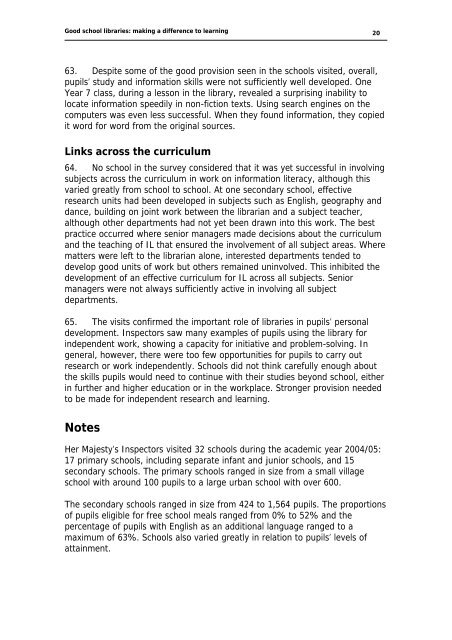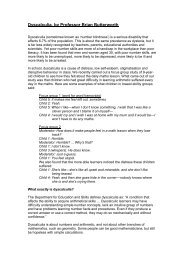Good school libraries: - Digital Education Resource Archive (DERA)
Good school libraries: - Digital Education Resource Archive (DERA)
Good school libraries: - Digital Education Resource Archive (DERA)
You also want an ePaper? Increase the reach of your titles
YUMPU automatically turns print PDFs into web optimized ePapers that Google loves.
<strong>Good</strong> <strong>school</strong> <strong>libraries</strong>: making a difference to learning 20<br />
63. Despite some of the good provision seen in the <strong>school</strong>s visited, overall,<br />
pupils’ study and information skills were not sufficiently well developed. One<br />
Year 7 class, during a lesson in the library, revealed a surprising inability to<br />
locate information speedily in non-fiction texts. Using search engines on the<br />
computers was even less successful. When they found information, they copied<br />
it word for word from the original sources.<br />
Links across the curriculum<br />
64. No <strong>school</strong> in the survey considered that it was yet successful in involving<br />
subjects across the curriculum in work on information literacy, although this<br />
varied greatly from <strong>school</strong> to <strong>school</strong>. At one secondary <strong>school</strong>, effective<br />
research units had been developed in subjects such as English, geography and<br />
dance, building on joint work between the librarian and a subject teacher,<br />
although other departments had not yet been drawn into this work. The best<br />
practice occurred where senior managers made decisions about the curriculum<br />
and the teaching of IL that ensured the involvement of all subject areas. Where<br />
matters were left to the librarian alone, interested departments tended to<br />
develop good units of work but others remained uninvolved. This inhibited the<br />
development of an effective curriculum for IL across all subjects. Senior<br />
managers were not always sufficiently active in involving all subject<br />
departments.<br />
65. The visits confirmed the important role of <strong>libraries</strong> in pupils’ personal<br />
development. Inspectors saw many examples of pupils using the library for<br />
independent work, showing a capacity for initiative and problem-solving. In<br />
general, however, there were too few opportunities for pupils to carry out<br />
research or work independently. Schools did not think carefully enough about<br />
the skills pupils would need to continue with their studies beyond <strong>school</strong>, either<br />
in further and higher education or in the workplace. Stronger provision needed<br />
to be made for independent research and learning.<br />
Notes<br />
Her Majesty’s Inspectors visited 32 <strong>school</strong>s during the academic year 2004/05:<br />
17 primary <strong>school</strong>s, including separate infant and junior <strong>school</strong>s, and 15<br />
secondary <strong>school</strong>s. The primary <strong>school</strong>s ranged in size from a small village<br />
<strong>school</strong> with around 100 pupils to a large urban <strong>school</strong> with over 600.<br />
The secondary <strong>school</strong>s ranged in size from 424 to 1,564 pupils. The proportions<br />
of pupils eligible for free <strong>school</strong> meals ranged from 0% to 52% and the<br />
percentage of pupils with English as an additional language ranged to a<br />
maximum of 63%. Schools also varied greatly in relation to pupils’ levels of<br />
attainment.



